


BRIGHT APP - Click HERE MONTANA 211 - Click HERE
Recovery signals a dramatic shift in the expectation for positive outcomes for individuals who experience mental and substance use conditions or the co-occurring of the two.
SAMHSA's working definition of recovery defines recovery as a process of change through which individuals improve their health and wellness, live self-directed lives, and strive to reach their full potential.
Today, when individuals with mental and/or substance use disorders seek help, they are met with the knowledge and belief that anyone can recover and/or manage their conditions successfully. The value of recovery and recovery-oriented systems of care is widely accepted by states, communities, health care providers, peers, families, researchers, and advocates including the U.S. Surgeon General, the National Academy of Medicine (NAM), and others.
Hope, the belief that these challenges and conditions can be overcome, is the foundation of recovery. A person’s recovery is built on his or her strengths, talents, coping abilities, resources, and inherent values. It is holistic, addresses the whole person and their community, and is supported by peers, friends, and family members.
The process of recovery is highly personal and occurs via many pathways. It may include clinical treatment, medications, faith-based approaches, peer support, family support, self-care, and other approaches. Recovery is characterized by continual growth and improvement in one’s health and wellness and managing setbacks. Because setbacks are a natural part of life, resilience becomes a key component of recovery. (SAMHSA)
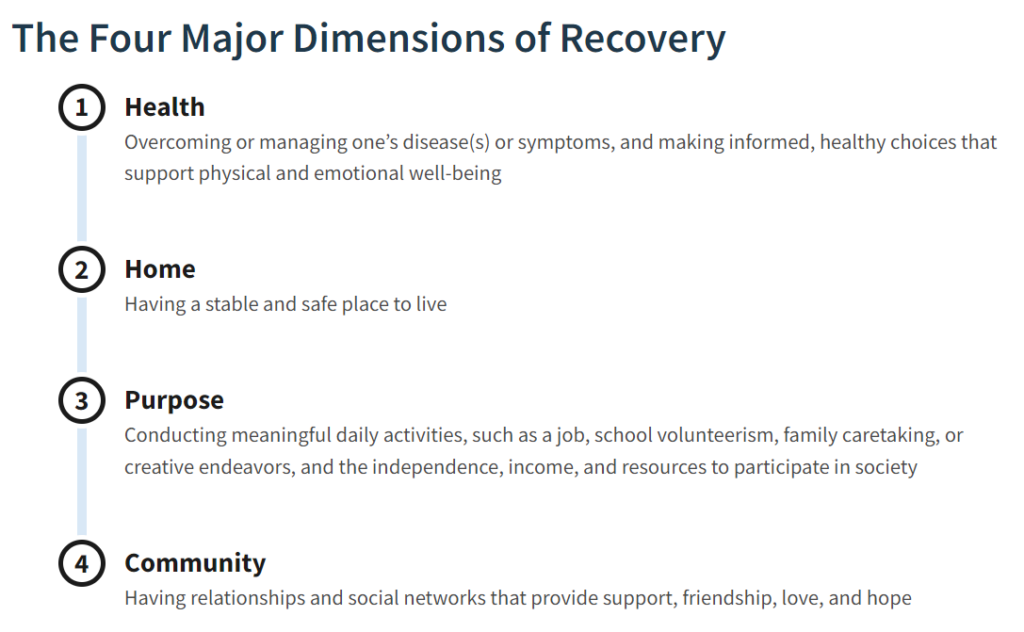
A Recovery Residence is a specialized living environment designed to support individuals on their journey to recovery from addiction. These homes provide a safe, supportive, and drug-free environment, crucial for those transitioning from intensive treatment settings, such as inpatient rehab, back into the community. Emphasizing peer support, residents live with others undergoing similar recovery journeys, fostering a sense of community and shared experience. These residences typically operate with structured guidelines that residents are expected to follow, ranging from maintaining sobriety to participating in house meetings. The National Alliance for Recovery Residences (NARR) has delineated several levels of recovery residences, indicating the intensity and kind of support offered. The goal of these homes is not only to provide a stable living environment but also to facilitate the individual's reintegration into society. By offering access to essential services, from counseling to job training, and fostering the development of vital life skills, recovery residences play an indispensable role in ensuring the long-term success of an individual's recovery journey.
Recovery Access Montana (RAM) is a statewide organization and the official Montana affiliate of The National Alliance for Recovery Residences (NARR). We are a network of recovery home operators, community stakeholders, and individuals committed to ensuring safe, supportive, and sober housing for those with substance use disorders.
Visit RAM Montana here
The purpose of a recovery residence is to provide a safe and healthy living environment to initiate and sustain recovery—defined as abstinence from alcohol and other non-prescribed drug use and improvement in one’s physical, mental, spiritual, and social wellbeing. Individuals build resources while living in a recovery residence that will continue to support their recovery as they transition to living independently and productively in the community. (NARR https://narronline.org/)
Recovery residences are divided into levels of support based on the type as well as the intensity and duration of support that they offer. Services provided span from peer-to-peer recovery support (all recovery residences) to medical and counseling services (recovery residences offering higher levels of support). (NARR https://narronline.org/)

Adult and Teen Challenge - Inpatient faith-based treatment and recovery (serves women only). Missoula Campus: The Missoula Campus is a residential, long term recovery and discipleship program for women suffering from drug and alcohol addiction, and has capacity for 20 students. Students at this campus take part in vocational training and participate in a Christ-centered curriculum.

Crosswinds Recovery - Integrated structured recovery housing with state-licensed outpatient chemical dependency program which also offers multiple resources: safe, supportive housing, peer support specialists, community mentors, drug testing, along with group and individual counseling
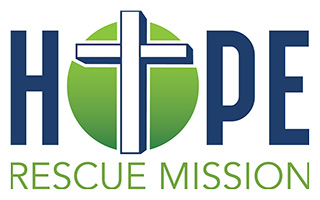
Grace House Women's Center - At the Women’s Center, women explore the root causes of addictions and other destructive behaviors within a safe, homelike environment that also welcomes and nurtures their children.
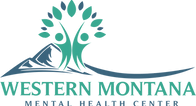
Recovery Center Missoula (RCM) - 24-hour 3.1 SUD low intensity program for men. The goal of Recovery Center Missoula is to provide a safe, supportive, and structured environment to assist men in addressing their recovery from drugs/alcohol, aiding in self-sufficiency to transition to life of continued sobriety.
Several outpatient-based recovery services are available in Missoula County that are able to meet the needs of all individuals. In addition, there There are 12-step groups, mutual aid groups, substance-free activities and recovery residences.

All Nations Health Center - Culturally-centered outpatient treatment

Drop-in Center - Hope Rescue Mission offers a long-term recovery program for people dealing with overwhelming personal issues such as addiction, domestic violence, or a criminal record.

Ideal Option - Outpatient and MOUD (Medications for Opioid Use Disorder) treatment

Mountain Home Montana - Inpatient and outpatient treatment (serves women and their children)
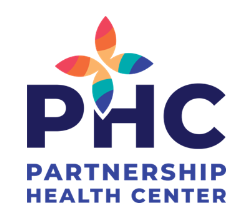
Partnership Health Center - Outpatient and MOUD treatment

Stepping Stones Behavioral Health Services - Outpatient treatment
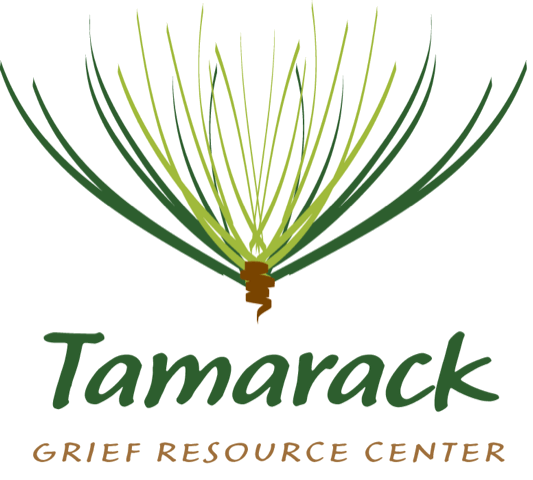
Tamarack Grief Resource Center - Counseling for youth, teens, adults, couples and families throughout Montana
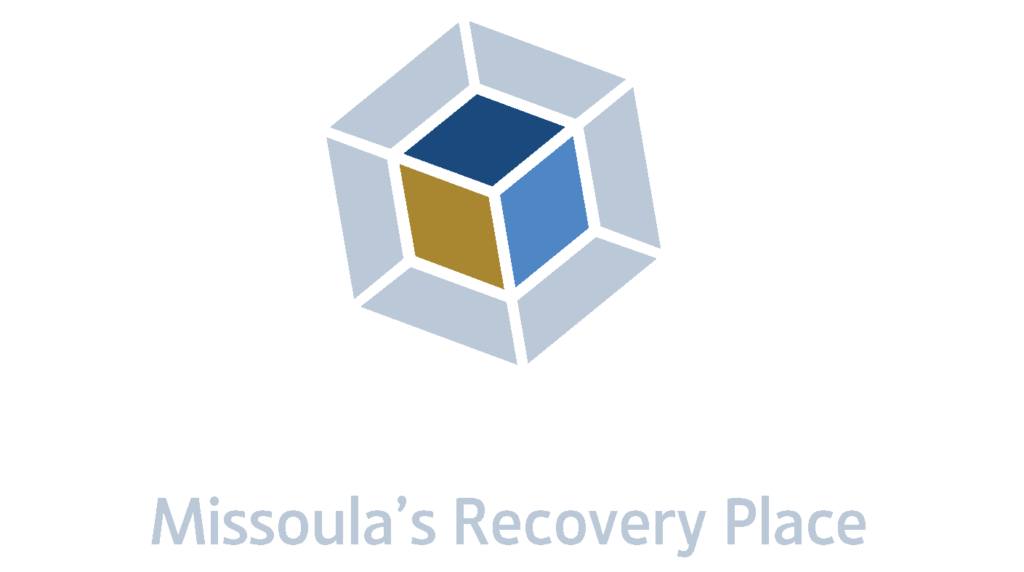
The Fourth D Club - A safe, alcohol and drug free environment for people whose lives have been impacted by the disease of alcoholism and/or drug addiction. the 4th D Club provides meeting space, activities, resources and support for those who are in recovery

University of Montana Curry Health Center - Outpatient counseling and treatment services for students

Alcoholics Anonymous: A fellowship of people who share their experience, strength and hope with each other that they may solve their common problem and help others to recover from alcoholism.

Tamarack Grief Resource Center - Counseling for youth, teens, adults, couples and families throughout Montana